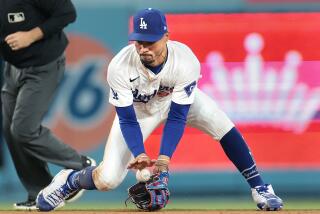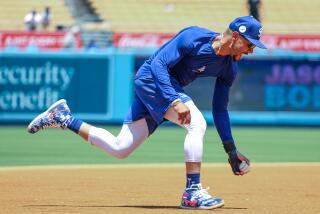He’s No Angel, and Happily So : Joyner Replaces Brett as No. 3 Hitter in Royals’ Lineup, but There Appears to Be No Bad Feelings in Clubhouse
- Share via
BASEBALL CITY, Fla. — Having once replaced Hall of Famer Rod Carew in the Angels’ lineup, Wally Joyner has displaced future Hall of Famer George Brett in the batting order of the Kansas City Royals.
The first baseman will bat third in the revamped lineup, with Brett, approaching 39 after being a fixture at No. 3 for most of his 18 years with the Royals, dropping to fifth. Demoted, Brett called it, adding:
“No one likes to lose their position, but it’s not like I’m losing it to a guy from double-A. Wally is a proven All-Star. At this point in our careers, he’s the better hitter.”
The assignment is a show of respect for Joyner, who said he appreciates it, particularly because he remains disturbed by the portrait he believes owners Gene and Jackie Autry painted of him during the negotiations that led to his departure from the Angels as a free agent. He signed a one-year, $4.25-million deal with Kansas City that permits him to become a free agent again next winter.
“The one-year contract was a quick fix for both the Royals and myself,” Joyner said. “I asked for the repeater rights as leverage, but my desire is to sign a multiyear contract with Kansas City. Now that I’ve been here a couple of weeks, I feel more strongly about that than when I signed. It’s the well-run, class organization I had always thought it was. I have no regrets.”
Speaking by phone, Jackie Autry implied that the Angels have no regrets either.
“I’m tired of talking about it,” she said. “I don’t care what Wally says anymore. I don’t want to bash him, but a lot of people, including some of his peers, have come to us and said we’re probably better off without him.
“Gene Autry tried to do everything he could for him, but (Joyner) was always taking shots at the Angels. You can get tired of that in a hurry.”
It is Joyner’s contention that the Autrys questioned his desire and effort and labeled him more of a loner than a leader in the clubhouse. Was any of that in the Royals’ scouting reports?
“The only thing we looked at was his overall production,” General Manager Herk Robinson said. “No one’s perfect, but Wally had no shortcomings in our eyes at all.”
Said Joyner: “The Autrys started nit-picking and it blew up from there. I understand and accept the negotiating process, but it was frustrating and disappointing to hear the rumors that kept coming back to me.
“I mean, it was a shock to have my desire to play questioned, my role in the clubhouse. I’m glad to be away from it.”
Joyner said he never heard it directly from the Autrys but was informed by people who heard the Autrys talk about it during meetings. “And it wasn’t just one person but a few people who told me,” he said. “It also didn’t just start during the last negotiations but before that.”
Joyner said he would apologize if proved wrong, but found it strange that the Autrys have never told him it was a misunderstanding, that he was mistaken.
“They’ve never come to me to explain the way they really felt,” he said. “They’ve left it out there as if to confirm what I had been hearing. There were also two occasions when we had a handshake agreement with Whitey (Herzog, Angel senior vice president), only to have him come back and say (Jackie Autry) had vetoed it. I mean, he looked at me and asked, ‘What does she have against you?’ ”
Jackie Autry denied that she had vetoed a deal and said she and her husband never talked derogatorily about Joyner. She said the Angels’ four-year, $16-million offer was more than a cursory indication of their desire to keep Joyner, and that it was her decision, at a time when the negotiations appeared dead, to increase the distribution in the first two years by $750,000, meeting Joyner’s demands.
She also said that, after Joyner’s third year with the team, when there was already a history of troubled relations and negotiations, she and her husband invited Joyner to lunch at Lakeside Country Club to assure him of their regard for him and to attempt to dissuade him from pursuing an acrimonious arbitration.
And, she added, on the night before Joyner decided to accept the Royals’ offer at the December baseball meetings in Miami, Angel public relations director Tim Mead paid a post-midnight visit to the hotel
where Joyner was staying. Mead attempted to talk him out of that decision and persuade him that the reports he was hearing in regard to things the Autrys were allegedly saying about him weren’t accurate.
In other words, Jackie Autry said, there were attempts to provide communication and clear up the misunderstanding, but to no avail.
Now?
“I don’t know this for a fact, but I suspect Wally does regret his decision and is just looking for ways to justify it,” she said.
Joyner smiled and said he understands how his decision to take a one-year contract over the security of a four-year deal that was virtually everything he wanted could be questioned. At the 11th hour, when it was finally all there, Joyner said he simply grew tired of his troubled negotiations with the Angels. He also said he had promised the Royals that he wouldn’t involve them in a bidding war. Thus, the quick fix of a one-year contract.
“I’m happy now, but I wouldn’t have been if I had stayed with the Angels just because of the money,” he said. “It wasn’t an easy decision because of the friendships, memories and fun I had playing there, but I’m glad it’s over. I feel like a new person, that this is a new start. I think we all reach a point where that’s necessary.”
In his 5 1/2 years--he sat out the second half of the 1990 season because of a knee injury--as perhaps the finest player ever produced by a comparatively unproductive Angel farm system, Joyner batted .288 and averaged 19 home runs and 86 runs batted in. He said he took pride in his performance with the Angels.
“I don’t think I have to hang my head about anything I did with the Angels,” he said. “I’m not naive enough to think I was perfect or that there were things I couldn’t have done better, but I was satisfied with what I did there, and I think I’ll continue to be a better player because of the experience.”
On the issues that clouded his departure--an alleged lack of intensity, hustle and clubhouse leadership--Joyner said they were without validity.
“We’re human,” he said. “Over the course of a season we’re not going to do everything perfectly. I hit a popup in Minnesota last year and didn’t run as hard as I should have.
“When it dropped, I was the first one to realize my mistake. No one felt worse, but it was one play, and to overreact to that was nit-picking.” Joyner also said he heard that he was held responsible for sitting out the 1986 playoffs against the Boston Red Sox because of a staph infection--”the people who questioned that never came to see me in the hospital”-- and for being sidelined during spring training in 1989 because of an ankle sprained while playing basketball.
He also said that after his knee injury two years ago: “It even came back to me that some people in the organization felt I must have been playing basketball again. I mean, there were a lot of times I played hurt there, but when I couldn’t, there was always suspicion. I’m glad I don’t have to deal with that anymore.”
Of his clubhouse demeanor, Joyner shook his head and said: “I enjoy playing baseball. I enjoy my teammates and appreciate what they give to me. My personality is such that I don’t like to be alone. I can’t think of one player I wasn’t with at one time or another there. I thought I had a lot of friends in the clubhouse. We did a lot of things together on the road, but obviously there are times during the course of a season at home when I would prefer to be with my family, which is more important to me than anything.
“The key is that I never once heard another player complain about how I went about things. I never heard anyone in the clubhouse say I wasn’t spending enough time with the other players or was coming late and leaving early.
“I’d be concerned if this was coming from the players, but it’s coming from people who don’t know what they’re saying and didn’t take time to find out what the situation really was, and I know that a lot of what was said came from the Autrys.”
Now, Joyner cares only about what is said by the Royals. Said Robinson: “I think we’re as good as any club in the division now, as good as any in baseball, and I don’t think I could have said that if we hadn’t signed Wally and hadn’t traded Bret Saberhagen.”
The Joyner signing allowed the Royals to compensate for the run production lost by Danny Tartabull’s departure as a free agent and opened the door to the trade that sent Saberhagen to the New York Mets for Kevin McReynolds, Gregg Jefferies and Keith Miller.
The Royals, believing the status quo wasn’t good enough to compete in a tough division, have undergone a transformation since the beginning of the 1991 season. Gone are Bo Jackson, Tartabull, Saberhagen, Kurt Stillwell, Kirk Gibson and Bill Pecota, among others.
Few teams have a set lineup entering spring training, but Manager Hal McRae is planning this lineup: Brian McRae, center field; Jefferies, third base; Joyner, first base; McReynolds, right field; Brett, designated hitter; Mike Macfarlane, catcher; Miller, left field; Terry Shumpert, second base, and David Howard, shortstop.
“Great balance,” McRae said of his batting order. “Difficult to pitch around. A lot of ways to attack. We can run or sit back and slug. We plan to do both.”
And Joyner? “One of the best left-handed hitters in baseball,” McRae said. “Easy power and a consistent stroke that never changes no matter what the situation is. I mean, when you say third in the order, that says it all, particularly on this club, where you’ve got four guys capable of hitting third--McReynolds, Brett, Jefferies and Joyner.”
Brett, a year after winning his third batting title at .329, batted .255 last season when forced to wear a heavy knee brace after suffering a partial ligament tear in April. He called his first full season as a DH “three hours of nightly hell,” but now believes he knows how to handle it.
Of the decision to drop Brett in the batting order, McRae said it was time to lift the pressure of carrying the club from Brett’s shoulders.
“It’s always been, ‘As Brett goes, so go the Royals,’ ” McRae said. “That doesn’t have to be the case anymore. We have people who can share the responsibility. George is in great shape, and I think he feels he has something to prove. I expect him to have a good year, .280 to .300 with double figures in home runs and 80 to 100 RBIs, but he can do it as a complement to the others. He doesn’t have to hit .330 and 30 home runs.”
Said Brett: “I was disappointed (by being dropped from No. 3) and came to camp with the idea of talking Hal out of it, but I walked out of his office agreeing 100%. Look, I’ll be 39 in May. I know I can’t carry the team the way I have in the past. I know I can do better than the numbers Hal is talking about, but I don’t have to face the pressure of doing it.
“On paper, at least, we haven’t had a team this good since ‘85, when we hit .290 (actually .252) as a team and then beat St. Louis in the World Series.”
Said Joyner, of his position in the batting order: “I told Hal that I was concerned about George and didn’t want to disrupt the team or the chemistry. I told him I had hit anywhere between second and seventh with the Angels, and it didn’t matter to me.
“It was Hal’s decision, and George made it easy. We had a good talk and he said there was no problem. The only thing hitting third really means to me is that you’re up in the first inning. On this club, we have seven or eight guys capable of putting the ball in play, and they can’t all hit third.”
More to Read
Go beyond the scoreboard
Get the latest on L.A.'s teams in the daily Sports Report newsletter.
You may occasionally receive promotional content from the Los Angeles Times.






